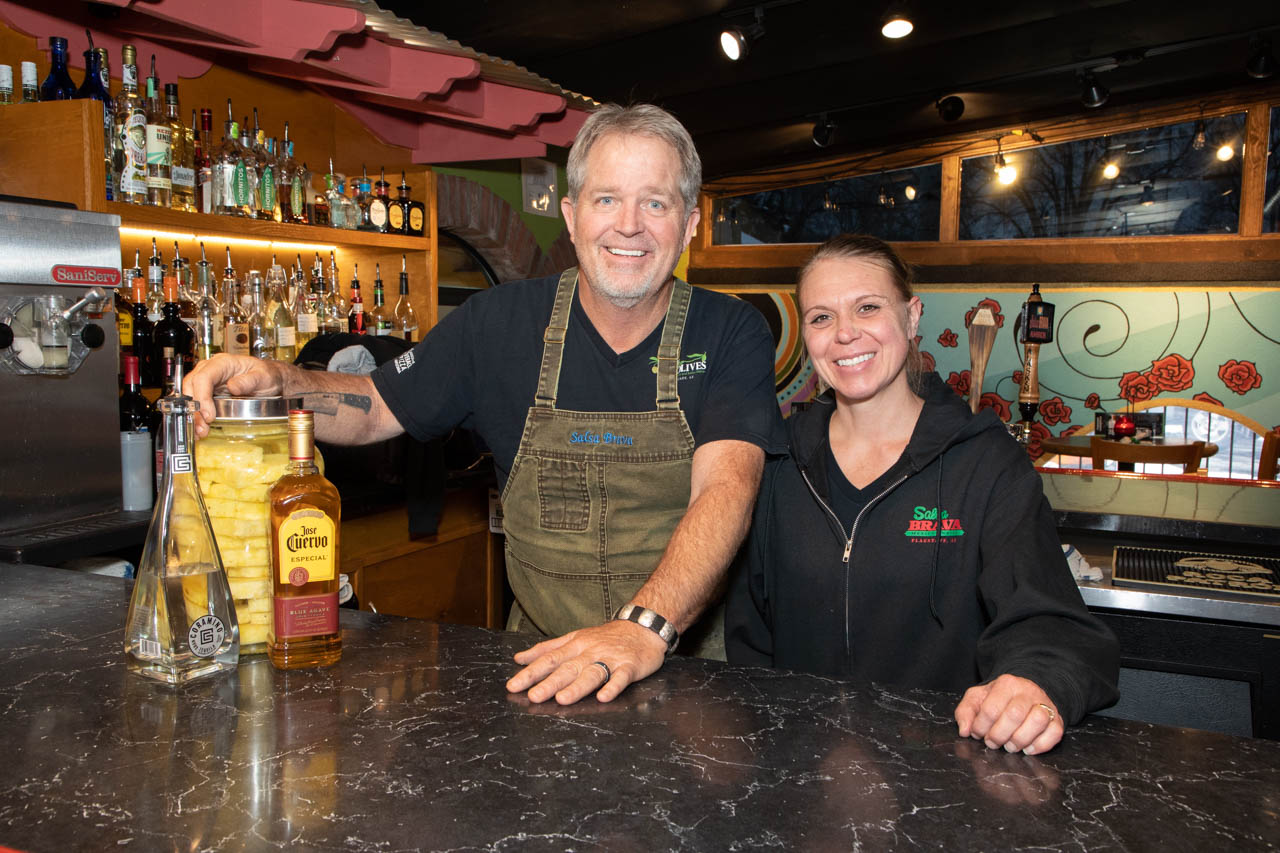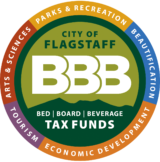Community and Business Building Each Other
When John Conley came to Flagstaff to study at NAU’s School of Hotel and Restaurant Management, he’d already been working in restaurants since he was 13 years old. Conley knew he wanted to spend his life in the kitchen. “I mean the heat of the kitchen, people yelling and screaming… it was like home,” he explains, comparing the “mayhem and chaos” of his childhood home of seven children to the intensity of the kitchen environment.
Conley was still a student when the opportunity came up to start a restaurant in West Flagstaff. He decided to take the risk even though it meant leaving school in the middle of his senior year against the advice of teachers, counselors, and family. The tiny taco shop Conley opened was the first iteration of Salsa Brava, which eventually became a Flagstaff staple, opening the door for Conley to expand his business.
A Tradesman, Not an Artist
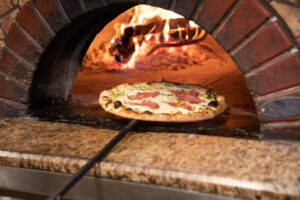 Conley is passionate about food, but describes his approach as that of a tradesman rather than an artist. He has learned techniques and styles practiced in different parts of the world and used that knowledge to hone his particular craft. Over its lifetime, Salsa Brava evolved to incorporate first Guadalajaran style cuisine, then Sonoran, then Oaxacan.
Conley is passionate about food, but describes his approach as that of a tradesman rather than an artist. He has learned techniques and styles practiced in different parts of the world and used that knowledge to hone his particular craft. Over its lifetime, Salsa Brava evolved to incorporate first Guadalajaran style cuisine, then Sonoran, then Oaxacan.
When there was nowhere left to go in Mexico, Conley moved on to Italy and a new restaurant inspired by the wood fired pizzas he’d been making in his backyard oven. Fat Olives pizzas are Neapolitan style, a regional variety found in Naples. To be allowed to claim “Neapolitan” distinction, the restaurant maintains “VPN” (Vera Pizza Napoletana) certification, adhering to strict standards for ingredients and even the oven where the food is cooked.
Now, Conley is looking to the States for inspiration and building a New York-style kettle-boiled bagel shop to open between his other two restaurants on Route 66. Its menu will feature take-out friendly options like sandwiches, soups, and salads that can be ordered via drive-through. The shop itself will be a “community project restaurant,” according to Conley, employing young adults with developmental disabilities.
A Team Effort
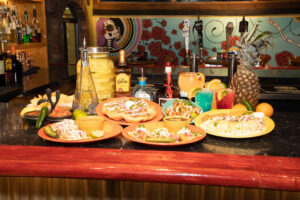 Conley admits that when he was first starting out, he wasn’t great at being a restaurant owner: “I was 21 years old. I was a self-centered egomaniac. I slept in the restaurant. I worked a year straight. I just didn’t have the skills… I made a ton of mistakes.”
Conley admits that when he was first starting out, he wasn’t great at being a restaurant owner: “I was 21 years old. I was a self-centered egomaniac. I slept in the restaurant. I worked a year straight. I just didn’t have the skills… I made a ton of mistakes.”
Today, Conley is about as far from that description of his younger self as possible. He values every person he employs and what they bring to the table. He has gone so far as to restructure the company so that his General Managers, Ashlea Lindemuth of Salsa Brava and Kaiti DuPuy of Fat Olives, are now partners with shareholding stakes in the restaurants.
Conley can’t say enough positive things about the partnership structure or his choice of business partners, each of whom worked their way up through their restaurant over years of employment. “They absolutely deserve it. They do the heavy lifting around here. They do the day to day operations. They allow me to promote on a wider scale. They allow me to do the R&D that I need to do to open another property… I wish I’d done it ten years ago.”
The Customer Comes Second
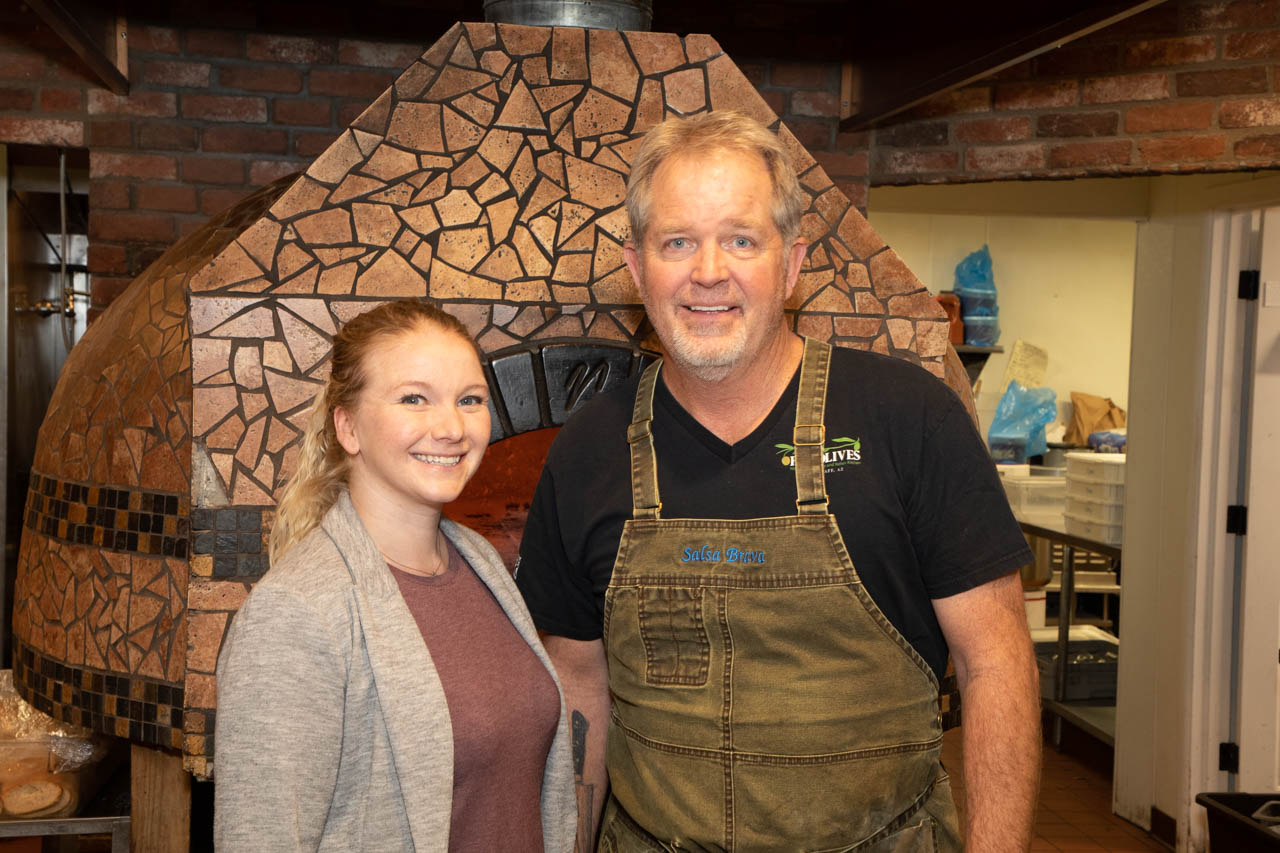 Both General Managers boast of extremely high employee retention rates and numerous long-term employees. According to DuPuy, that comes from putting staff first:
Both General Managers boast of extremely high employee retention rates and numerous long-term employees. According to DuPuy, that comes from putting staff first:
“I believe that my team is the most important thing in the restaurant. When you have a group of individuals that are inspired to come to work and are passionate about what they do, naturally the food is going to be great, the service is going to be awesome, and people are going to want to return. So, I think it really just starts with a good group of people, all working towards a common goal.”
Lindemuth also highly values her team, especially when it comes to respecting their time away from work, a courtesy Conley has granted her over the years:
“What Salsa Brava has given me, I try to give to the staff… I try to honor and respect their outside responsibilities as much as mine are honored and respected, because if I don’t do that, then nobody is going to stay here and be a part of my team. They’re going to find somewhere different. I have to set my personal standards high to exemplify and model leadership for my staff so that they also set their own personal standards at a high level to achieve our goal as a company in whole.”
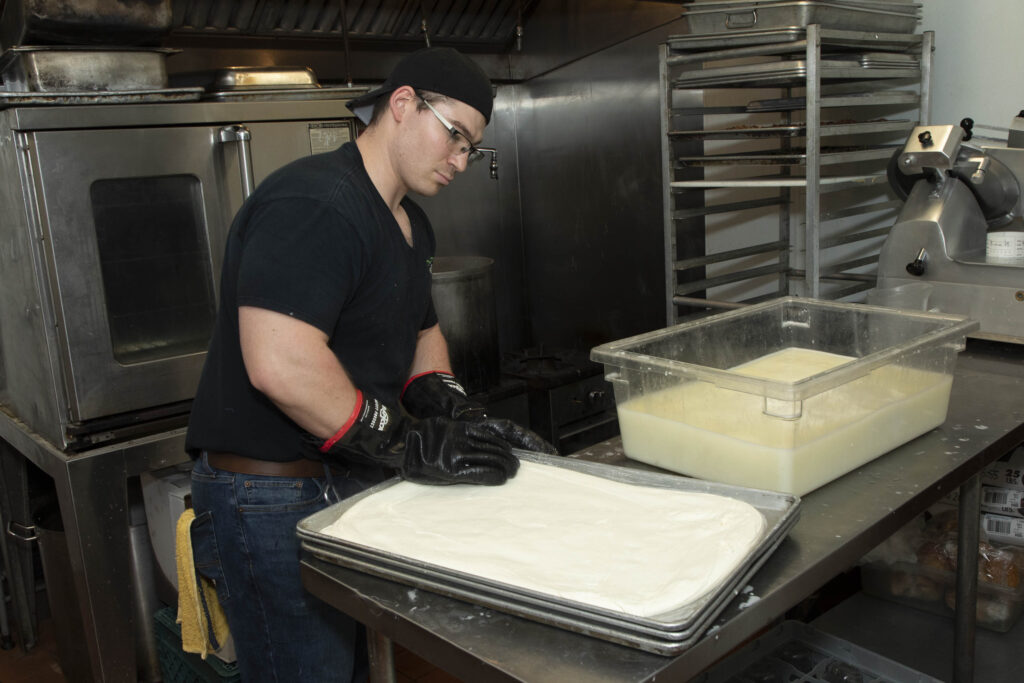 Every leader on the Salsa Brava/Fat Olives team is invested in helping their more than 120 employees learn, grow, advance, and be creative. At Salsa Brava, Lindemuth’s approach has grown out of reflecting on how she wanted to be treated when starting out in the restaurant industry, “I think that taking everybody under your wing and laying the basis down, but also not being too nitpicky… Coaching—a lot of coaching—is imperative for a successful team.”
Every leader on the Salsa Brava/Fat Olives team is invested in helping their more than 120 employees learn, grow, advance, and be creative. At Salsa Brava, Lindemuth’s approach has grown out of reflecting on how she wanted to be treated when starting out in the restaurant industry, “I think that taking everybody under your wing and laying the basis down, but also not being too nitpicky… Coaching—a lot of coaching—is imperative for a successful team.”
Conley, meanwhile, is all about granting employees kitchen time. “Everybody is given permission to go in and create,” he tells us, adding that, “Nine times out of ten it’s a failure, but it’s not really a failure because they got the opportunity to feel seen.”
Although DuPuy is prioritizes creating opportunities for employees to advance within Fat Olives, she also talks her responsibility extending beyond an employee’s tenure at her restaurant:
“You know, this is a stepping stone for many people—especially a lot of my younger employees, my students. So, I feel that I have a responsibility to put good workers out into the workforce. We can really set the standard for how you’re supposed to be treated in the industry, and how you’re supposed to perform for your boss, setting boundaries, being able to—you know—be a good employee and a good person.”
In fact, many Salsa Brava and Fat Olives employees over the years have gone on to open businesses in different parts of the country and turned to their former employer for guidance. “We have to share our experience, strength, and hope for everybody,” John explains. According to DuPuy, “That’s the goal. Success for everybody.”
Your Friendly Neighborhood Restaurant
Salsa Brava and Fat Olives have had their share of accolades (both local and not-so-local) over the years. The restaurants have been featured on Food Network shows and have won “Best of Flag” awards. Last year, Fat Olives was even ranked 41st on Yelp’s list of “Top 100 Places for Pizza in the Nation.” To put that ranking in context, DuPuy explains, “[There are] 74,000 pizza places in the entire nation. We’re 41st.”
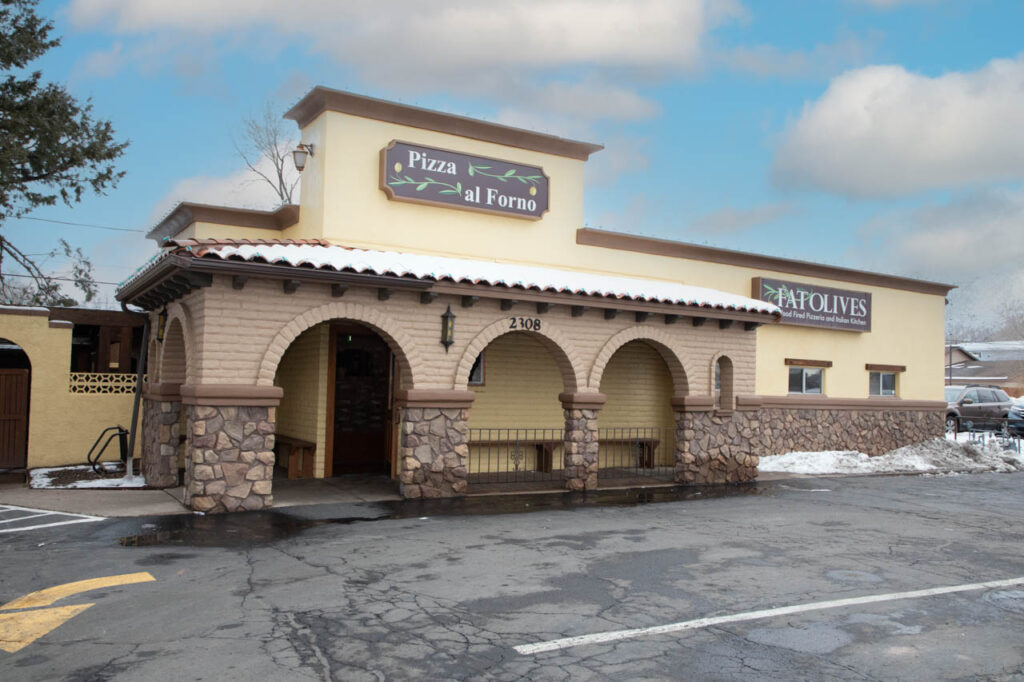 The team credits these successes to their “phenomenal” staff and to creating a small neighborhood feel at their restaurants. Despite having daily visitors who were drawn in because of something like a Food Network show, the folks at Salsa Brava and Fat Olives are concerned with taking care of local customers first. As DuPuy puts it, “We’ve got to make connections with our locals that come in every Friday night and sit at the bar to see Lexi and to have their usual, or to come in and see Mike with his limoncello… Those are the people that keep us going.”
The team credits these successes to their “phenomenal” staff and to creating a small neighborhood feel at their restaurants. Despite having daily visitors who were drawn in because of something like a Food Network show, the folks at Salsa Brava and Fat Olives are concerned with taking care of local customers first. As DuPuy puts it, “We’ve got to make connections with our locals that come in every Friday night and sit at the bar to see Lexi and to have their usual, or to come in and see Mike with his limoncello… Those are the people that keep us going.”
Beyond the locals who return again and again to their neighborhood restaurants, the team’s customers fall into two primary groups. First is out-of-towner who stop by Fat Olives or Salsa Brava each time they come through on an annual cross country vacation or who take their kids to the North Pole Experience each winter, a group they think of as sort of “secondary locals.”
Finally, the restaurants serve guests from all over the world who are in Flagstaff as tourists. Notably, each of these groups is welcomed with enthusiasm and treated “like family.” Conley values the opportunity to connect with a diverse set of patrons:
“One of the greatest things we get to experience is that cross section of the world…They’re going to the Grand Canyon and they stop in at Salsa Brava or they stop in at Fat Olives, so that’s really cool. And then we get to share our experience—you know—‘Where’s a good place to go see?’ and ‘What do you do around here?’ and ‘What are some of the sights?’ And we talk about that as a team here, that we need to welcome them in like family and share our local experience, because that’s part of our bread and butter too.”
Building the Community
Conley, DuPuy, and Lindemuth’s contributions to the community aren’t limited to providing great places to eat and to work in Flagstaff. They also work to be strong leaders. Conley describes working with other businesses in the community as follows: “One thing that I’ve really tried to model for everybody… is being a part of this community, and leading and modeling for other businesses and supporting non-profits, and doing a lot of work for the community.”
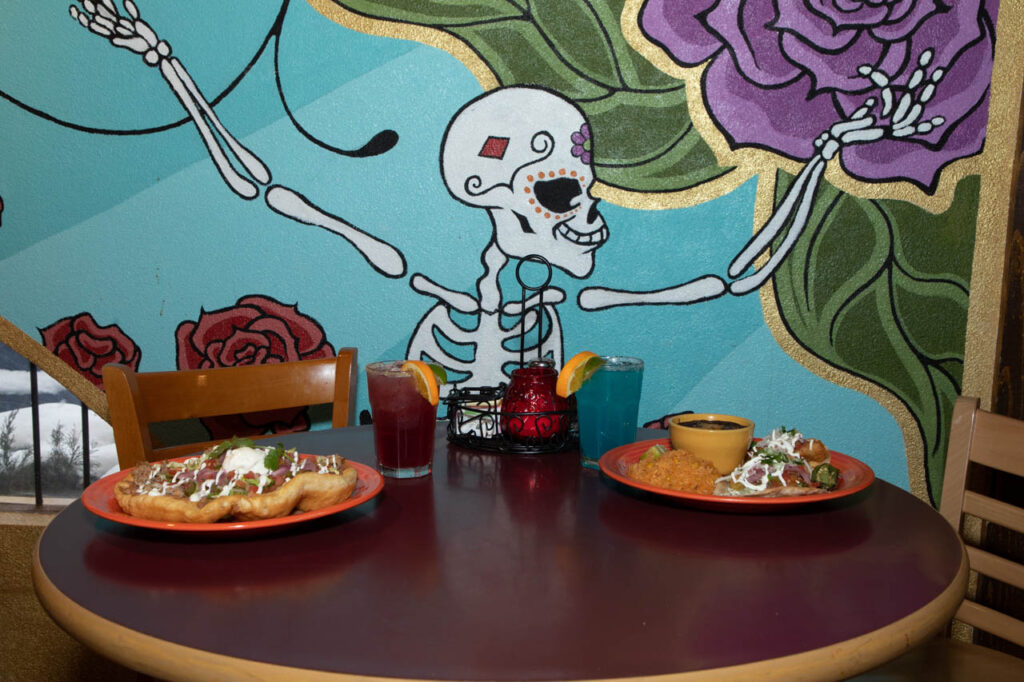 Even before they were made partners, each of the General Managers was given a “blank check” for making contributions to local causes they deemed important. Although in recent years the team has created a plan to allocate specific amounts of money for charitable contributions, they admit that the allocation usually gets exceeded. According to Conley, the contributions from his and other restaurants to the Flagstaff community are enormous:
Even before they were made partners, each of the General Managers was given a “blank check” for making contributions to local causes they deemed important. Although in recent years the team has created a plan to allocate specific amounts of money for charitable contributions, they admit that the allocation usually gets exceeded. According to Conley, the contributions from his and other restaurants to the Flagstaff community are enormous:
“We did kind of a napkin math—just like three or four of us [restaurant owners] who get together for coffee… and we determined that between 4 and 7 million dollars a year is given to our community either in kind, in services, or in money. There’s not a restaurant in town that doesn’t support their favorite non-profit, that doesn’t have their name on the back of a baseball, that doesn’t give gift cards.”
At Salsa Brava and Fat Olives, giving is focused on anything local, but in particular they have often supported initiatives related to education, feeding families, and special needs. Organizations looking for support from these restaurants can find more information on their websites, but they should be aware that the team tries to spread out contributions to help address all the community’s needs. That means a contribution one year doesn’t necessarily lead to another the following year.
Being in Flagstaff
All three team members at Salsa Brava and Fat Olives are in Flagstaff for the long haul. When asked how they feel about working and living in the town, each of the partners describes their own, similar reasons.
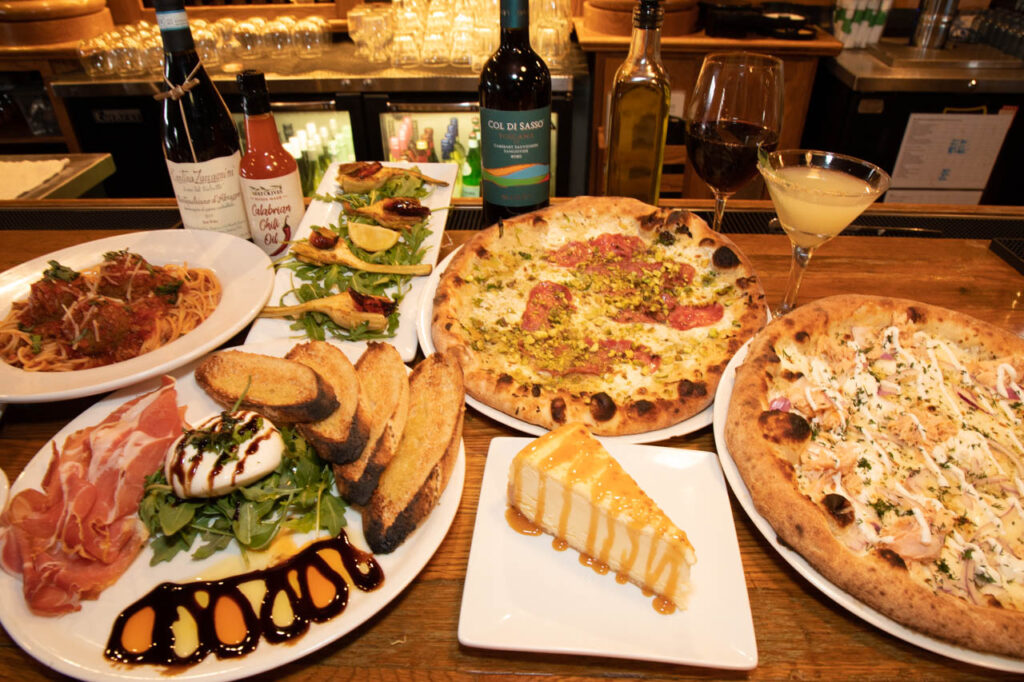 For Lindemuth, Flagstaff is a place that’s always been “home”:
For Lindemuth, Flagstaff is a place that’s always been “home”:
“I’m born and raised here in Flagstaff. I went to a private school, and then I graduated from Flagstaff High School. I moved to Tucson for a couple of years, came back to Flagstaff, decided I needed a huge change and then moved all the way to Louisiana for a couple of years, and then Flagstaff has just always been my home.”
DuPuy highlights the types of experiences that are available in Flagstaff for herself and her family:
“I’ve been in Flagstaff my whole life. I could never imagine leaving Flagstaff. It’s not that small hometown that people want to get away from… For me, Flagstaff has been great. My children love it here. My husband loves it here. We’re not leaving. And you know the draw to Flagstaff is really what we can experience in, I think, a decent sized city. But, you know, the outdoors is what people come for, and where else are we going to get beauty like this right in your backyard.”
For Conley, Flagstaff is a great place to live that gave him an amazing opportunity all those years ago:
“It’s Flagstaff. It’s the mountains. It’s the clean air. It’s—I could get my foot in the door on a lease. I found a spot that I could start from the ground up and really build it. I love everything about Flagstaff. It’s a great place to raise your family, good schools. I hiked five miles in the snow this morning with my dogs up on Observatory Mesa and there was nobody. It was awesome!”
Lessons and Advice for Business Owners
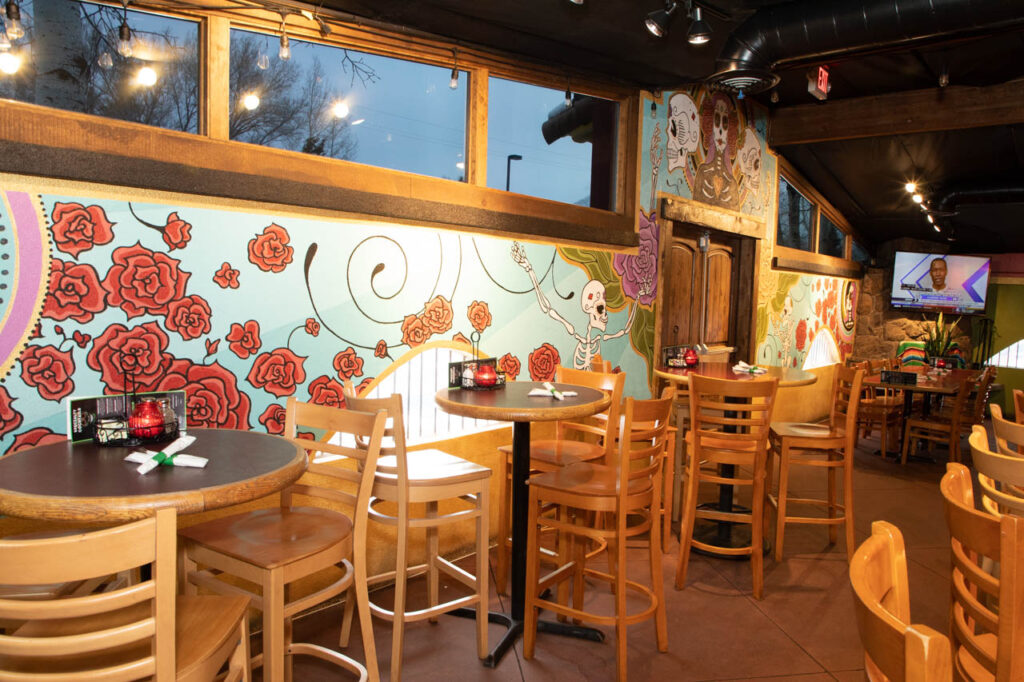 Conley has learned a lot in his years of doing business and making mistakes in Flagstaff, and he has a lot of advice to offer others on this journey, starting with: “Be patient.”
Conley has learned a lot in his years of doing business and making mistakes in Flagstaff, and he has a lot of advice to offer others on this journey, starting with: “Be patient.”
“People look at me as an industry leader because I’ve been here for 35 years, and they’re like, ‘Wow, you’ve done so well,’ but they didn’t see me when I was literally sleeping in the booth in the restaurant. You’ve gotta be patient.”
Other advice from the team includes, growing slowly, being consistent, investing in staff and community, running your business with integrity, and taking chances. According to Conley, “You’ve gotta take big, big, big chances.”


